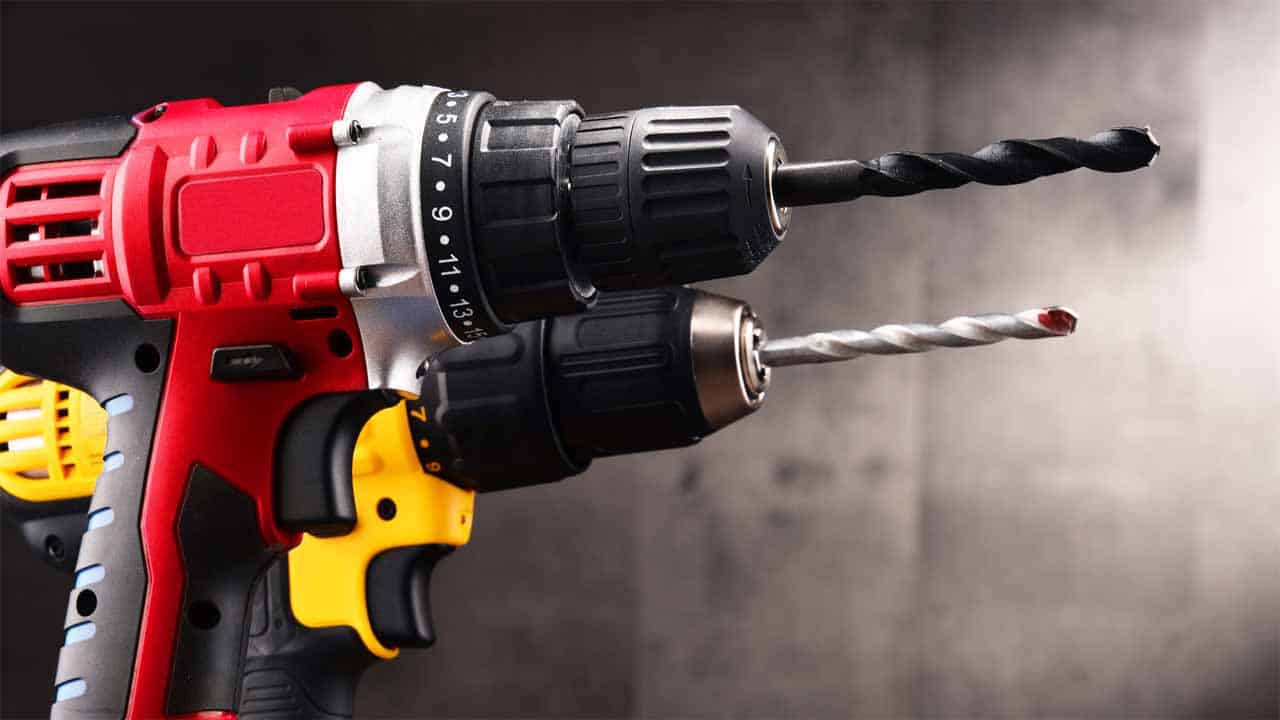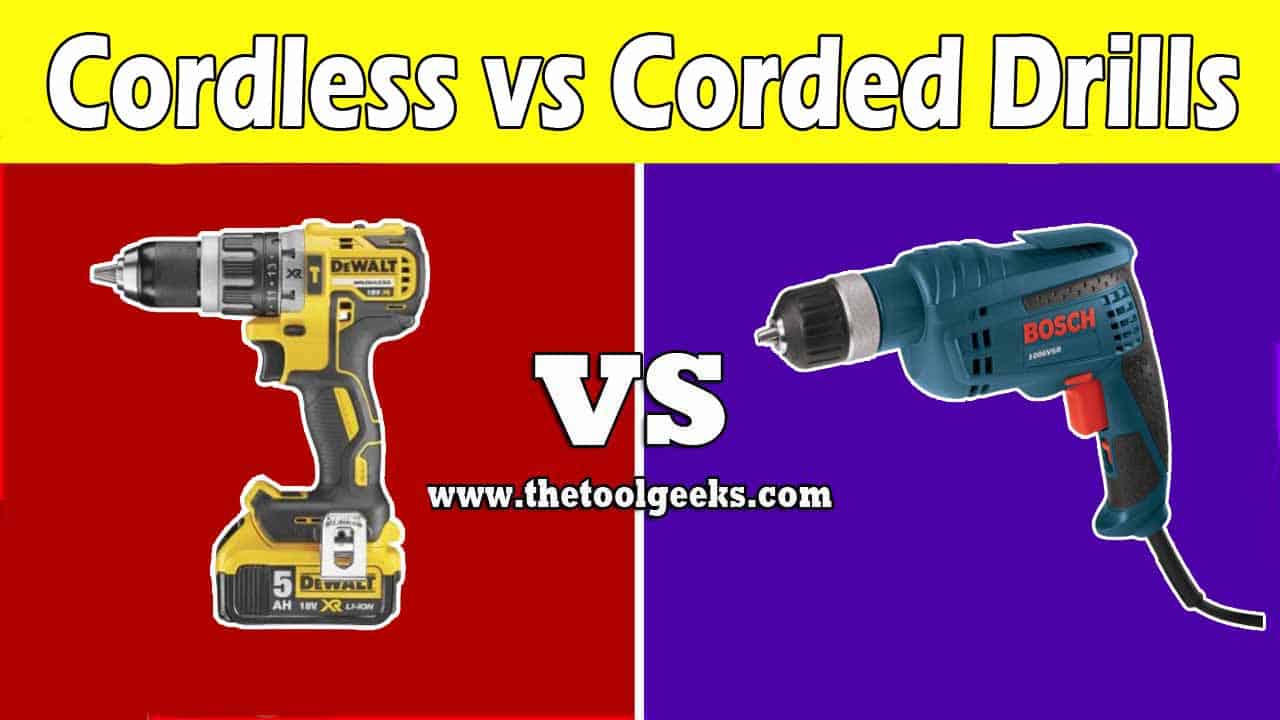Corded vs Cordless Drills (7 Differences)
TheToolGeeks.com is a participant in the Amazon Services LLC Associates Program and other affiliate advertising programs. We may earn from qualifying purchases. (Learn More).
Drills are one of the most important and versatile tools in woodworking, metal works, and other construction projects. It is used at construction sites and industrial areas by experts in the field and used by homeowners for DIY projects.
From drilling nails to removing rust from surfaces, making holes and so on, drills are sure a multi-functional tool that is always present in every toolbox. It is sure to come to your rescue and serve you efficiently as long as you can navigate your way using it.
There are two major types of drills, namely; the corded and cordless drills and one major constraint faced when trying to purchase this tool is usually the problem of which of the two drills to buy.
That is why in this article, we shall compare the corded vs cordless drills to figure out which will suit your needs the best.
What Is a Cordless Drill?
This type of drill is the most common and popular power drill due to many reasons attested to by users. It is a powerful tool with bearings on one end and a battery at its base- as it is powered with a battery.
From its name itself- cordless, which means “no cord”, this drill does not require any form of attachment to a source of power.

The cordless nature of the drill contributes to its portability and makes it a go-to for most handcrafters. This drill gets its source of power from a fully charged battery, capable of running for two-hours before shutting down. The battery could be a single or multiple batteries, depending on the run-time you require.
Hence, it does not need to be tethered to any socket or electric extension before it can function. Its portability contributes to its versatility, efficiency, and accuracy whilst supplying an even torque.
By default, its aesthetic design with a modern touch makes it equipped with a couple of attractive features. Some of these features include in-built lights, variable speed settings, the use of gears and other accessories, and a host of other features.
The cordless drill comes in four different shades, which are; drivers, hammer drills, rotary hammers, and impact drivers. While some parts of the cordless drill are, chuck, battery space and batteries, directional drill, clutch, work light, and speed control.
Pros
- Portable and mobile
- Can be used by homeowners and experts
- Equipped with a speed control
- Boasts of accuracy and precision
Cons
- Maximum runtime of two-hours
- Does not have much power
- Expensive
- Battery maintenance could be stressful and tasking
What is a Corded Drill?
From the name, one can easily depict that this type of drill has a cord. Though not popular as the cordless drill, this drill also boasts of equal higher efficiency and increased productivity while drilling into surfaces.

Unlike the cordless drill, this drill gets its source of power directly from an electricity source. Hence, it requires a bit of attachment or tethering before it can be used. This is one reason users do not find it portable and easy to transport.
Since it is a fixed tool, it suits the needs of professionals at construction sites or large workspace and not suitable for use by homeowners for DIY.
Its direct source from electricity makes it deliver a higher power output than the cordless drill, which gets its power from rechargeable batteries. As long as there is a regular supply of electricity, this drill will keep on running and users can never exhaust its runtime.
Except for its possession of a cord, it has the same parts as the cordless drill; likewise, they also share the varieties of drills they are available in. Another similarity between both drills is that they can drill into the same types of materials despite the huge differences in their source of power.
Pros
- It is not expensive
- Multi-functional
- High speed and power
- Efficient
Cons
- No new models of corded drills
- It is not portable and it is hard to transport
- Not suitable or recommended for beginners
Related Read — Brushed vs Brushless Drills
Corded vs Cordless Drills (Head to Head)
There is a wide range of differences between the corded and cordless drills, so many differences from clear indications one outweighs the other.
However, experts and professionals who use both tools regularly argue that deciding which is better depends on the project the user wishes to execute.
In this section, we shall examine the features common to both tools and compare their differences.
Source of Power
When it comes to their sources of power, corded drills are connected directly to electricity- and that is where they get their power. On the other hand, cordless drills get their power from batteries, which means that the corded drills are stronger than they are.
As long as there is a stable power supply, there is no limit to the amount of power that the corded drills can accommodate; and this is the sole reason they are stronger than the cordless drills.
Furthermore, the maximum motor power that the cordless drill can draw is from its 20-volt battery compared to more than 100-volt the corded drill get from electricity.
Durability and Strength
Since they hold more power, invariably, corded drills are stronger and more durable than cordless drills. For instance, the maximum a cordless drill can last if fully charged at once is two-hours. Whereas the corded drills can last much longer than that.
Therefore, the rationale for deciding their strength is the amount of power they hold. Corded drills are strong while cordless drills are weak.
Portability
The cordless drills are more portable than the corded drill. This is because the former does not require every time connection while the former does.
Connection to direct electricity limits its transportability whereas the cordless drill can be transported as many times as possible in comfortable and convenient ways.
Ease of Use
Portability is one reason the corded drills are not easy to use. They require constant tethering to a source of supply, which means they cannot function without electricity. The cordless drills on the hand, since they do not require any tethering are easier to use.
It only needs a fully charged battery- and if possible extra batteries, to get functioning. These features to their versatility and accuracy while supplying torque. Besides, it is not advisable to recommend a corded drill to a beginner but the cordless drill can be used by and recommended to a beginner.
The corded drill is also noisy, so if you value silence while working on any project or using the drill, it is advisable to settle for the cordless drill
Related Read — How to Drill Into Stucco?
Size
When it comes to size, we talk about compatibility, easy transport, and so on. The corded drill is easier to transport than the cordless drill. It is light weighted, compact, and can easily be moved from place to place.
The cordless drill feels more comfortable using than the corded drill- thanks to its bearable size, making you complete more tasks than would have done with the corded drill.
Grip Options
Another factor that determines your work output is the grip. Both drills of different sophisticated handles.
For improved and more convenient ripping, the grip can be replaced in both but the corded drill has a larger number of grip options than the cordless drill.
Lastly, corded drills have more advanced and multiple grip options than cordless drills.
Price
This is a crucial aspect of the comparison you should not skip, price is very important because it is the final determinant that clears one of the drills to become yours.
While the cordless drill is cheap and affordable, the corded drill is a bit expensive. Perhaps it is owed to the reason that the corded drill is more powerful, stronger, and generates more power than the drill.
Should you Buy a Cordless or Corded Drill?
Now that you are exposed to the differences between both drills and you are finally making plans to purchase either of them, the projects you wish to execute, and your budget are two of the most important things you should consider.
Both, along with some other factors are discussed in the section below.
Your Budget
Since it is clear which of the two drills is cheap and which is expensive, it is advisable to consider your pocket before deciding which to settle. The corded drill is quite expensive than the cordless drill.
Chuck Size
The clamp located at the end of the drill that holds the bit is called the chuck. It determines the functionality of the bit and how well a user enjoys its multiple grip options. The chunks used for the drills in this article come in three different hunk sizes, the ¼-inch, 3/8-inch, and ½-inch.
Related Read — Drill vs Dremel
Torque
Torque is another factor to key in while deciding which of the two drills to buy. It is measured in pounds-feet and is solely responsible for the twisting power of the drill. Drills with higher torque will let the bit cut through materials easily while it would be difficult for bits whose drills have lower torque to cut or drill through materials.
If you would be using your drill on materials like metals, stucco, and the likes, consider getting a drill with high torque performance. If you would be working on soft materials like plastic or wood, using drills with lower torque turnover will not be an issue.
Also, high-performance torque generating drills cannot be driven with a single hand. It must be driven with both hands, which is why it comes with extra attachments that allow users to operate the drill with both hands.
The Project You Want to Execute
The last factor to consider while deciding whether to purchase the corded or cordless drill is the kind and size of the project want to execute or work on. Since the corded drill generates more power than the cordless drill, there is a tendency that it will complete more work in a limited time than the cordless drill.
Speed is important. That is why you should also consider the variable speed setting available in both drills before settling for either of these two. Some corded drills operate at a single top speed while some operate for as much as 200-200 rpm.
Related Read — How to Drill a Lock?
Bottom line
From the information provided in this article, the corded drills are far powerful, stronger, durable, and have a longer run time than the cordless drills. However, when it comes to ease of use, convenience in transportability, and portability, the cordless drill beats the corded drill.
Also, torque performance, chuck size, the type and size of the project you want to execute, and your budget are the most important factors to consider before making a final decision on which of the two drills to purchase. If you are on a low budget, go for the cordless drill. But if you have a few more cash to spare, then you can settle for the corded drill.
In conclusion, both drills are important and essential in the job of every homeowner and professional, and they both have their uses. Where one has a downside, the other is there to bail you out and interesting, they can be substituted for each other should the need for such arise.
Amazon and the Amazon logo are trademarks of Amazon.com, Inc, or its affiliates.

